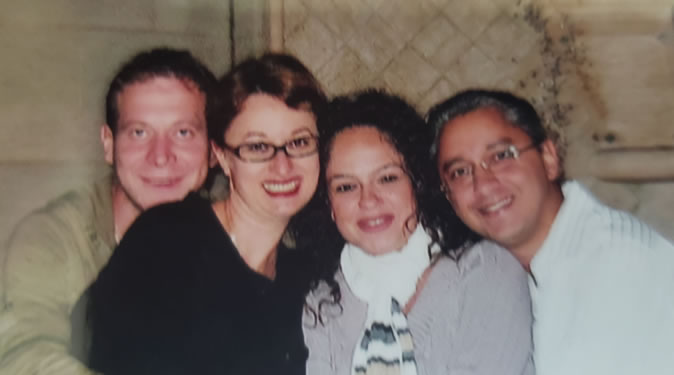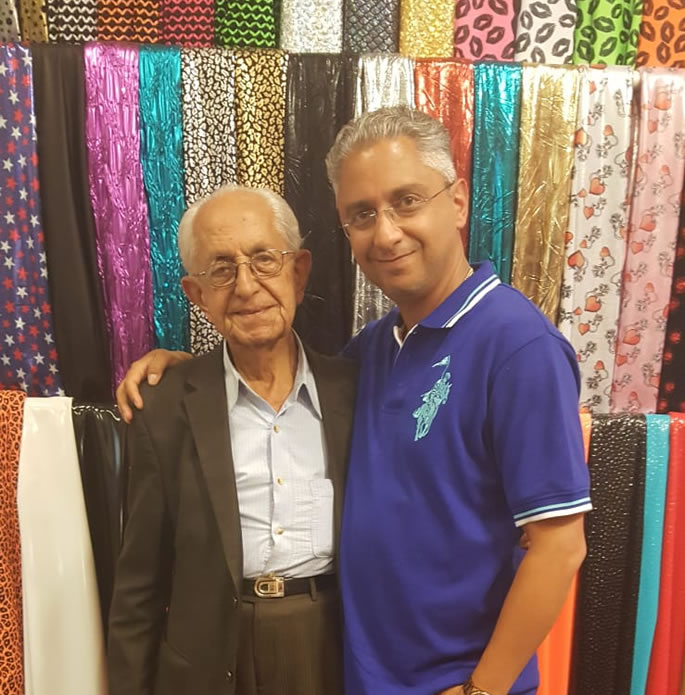There is a particular feeling of delight when situations that start out rocky transform into meaningful and memorable experiences. Such was our trip to Los Angeles in 2008, after being lured into an infamous timeshare presentation where we were awarded a “free” flight anywhere in the United States and a “free” hotel stay.
While searching through endless blackout dates, we finally settled on LA, and booked a trip which included Shemini Atzeret and Simchat Torah. As new returnees to the traditional Jewish way of life, we were not familiar with the nuances of the upcoming holiday.
When I realized that these were days of “rest”—when we would not be able to drive, shop, go out, or use electronics—I looked up the closest Chabad center to our hotel. It would be a long walk, but I was determined to make it work. When I called a childhood friend who now lived in LA, however, she told me that our “free” hotel was actually a dirty motel under major construction in an unsafe neighborhood. Since the only local ZIP code I knew was “90210,” we began calling hotels in the Beverly Hills area, hoping there would be some synagogues within walking distance.
Just before we boarded our flight, I found and booked a clean and affordable room in a Best Western near Pico and Robertson Boulevard. We landed only a few hours before candle-lighting. Due to heavy traffic, our taxi ride to the hotel took longer than expected, leaving us with no time to prepare for the holiday. It was a rough start, but we were determined to stay positive, and we still had some snacks from home.

I laugh as I think about it now, but at the time it felt overwhelmingly stressful. We washed up, changed, left our bags, and ventured out looking for the closest synagogue. We were thrilled to find ourselves in the middle of a Persian community with a synagogue on every block. When we saw a sign for “Chabad Persian Youth,” we were intrigued. We knew a little bit about Chabad, but this combination seemed unusual.
We walked inside, feeling apprehensive. The Chabad House was full of congregants, praying and welcoming the holiday. Almost everyone was of Persian descent. We stood in the back assessing the situation. Within minutes, people approached, introducing themselves. A woman who lived nearby ran to her house to bring us snacks. She didn’t want us to be hungry before the official holiday meal to which we were invited by everyone we met. This was surreal. My husband, Sasha, and I were complete strangers, yet somehow it felt like family members returning home. Not a single person focused on our differences or our lack of knowledge of Jewish laws. We shared a Jewish heritage, so we were one family, and that was enough.
One particularly friendly gentleman “adopted” my husband. I saw him move from the front of the synagogue to come stand by him during the prayers. After the service, my husband introduced me to Behdad Moshe Noorani, who reassured me that we would spend the holiday with his community and his family. He introduced me to his wife, Sharlyn, who was just as welcoming about sharing the next two days with us, two total strangers.
I now understood why so many Chabad centers were referred to as “houses”—they transformed regular buildings into warm and safe places.
That night we spent many hours sharing our stories over the evening meal. Despite our different backgrounds, we felt unity and friendship. Before this trip, we hadn’t had the opportunity to meet any Persian Jews. We were fascinated to hear about Sharlyn and Behdad’s experiences and backgrounds.
Behdad was born in Tehran in the early 1970s to a traditional Sephardic family. His father was a successful textile wholesaler who taught his son the responsibilities of his business at an early age. They observed the kosher laws and celebrated Shabbat. Behdad attended a Jewish school, and was taught to love and respect his Jewish heritage. He recalls, “While in Iran, my dad would take me to shul every Shabbat and my parents made sure I got a proper Jewish education. For that, I thank them every single day of my life! Everything that I am, and I know in Judaism, I owe it to my parents and my grandmother.”
Iranian revolutionary events started in the 1970s. Jews in Iran began to think about immigrating to Israel and the United States. The Noorani family sent their oldest son to the United States to pave the way; then in the mid-1980s, his sister followed.
In 1987, when Behdad was only 14 years old, his parents decided to send him to the United States to join his siblings. By this time, however, the political situation had escalated, and it was exceedingly difficult to leave the country. Behdad’s father had to hire a special guide to drive his son through the border to Pakistan.
“I was very scared. I heard horror stories about people getting caught, murdered and raped, but I had to stay strong and have faith in G‑d that everything was going to be OK! We were a group of 10 people, including a pregnant woman, a 7-year-old girl and an 18-year-old girl. I knew that my father paid extra money to drive me through the border, worried that crossing it by foot alone would be extremely dangerous.
“As we drove down one section of road, we realized that a few days ago border guards must have caught people like us, who were trying to escape. Massive boulders blocked the road, making it impossible to continue driving. We had no choice but to get out and continue on foot.
“It was extremely late at night, maybe 2 o’clock in the morning, and one of our guides helped the pregnant lady and little girl by taking them on the motorcycle. Unfortunately, there was no room for me, and the guide told me to just keep on walking. He showed me a path and handed me a bottle with dirty water. I started walking alone until I saw a fork on the road. I had no idea which route to take. I sat on the ground and started crying. I said the Shema and asked G‑d to guide me. A few minutes later, I heard the motorcycle. One of the guides had returned to look for me because everyone was waiting and he was scared that I was lost. I was so grateful to be found.
“It took us about three days to pass through the Iranian border to Pakistan. We stayed in a small city on the Pakistani side in a tiny guest house for 40 days, eating mostly bread and some seasonal fruit. When our documents cleared, we flew to Austria.
“After I arrived in Vienna, I finally felt safe. We were staying in a place run by RavTov Organization, led by Rabbi Michoel Pressburger, G‑d bless him. This rabbi helped thousands and thousands of Persian Jews escape to the United States through Austria. He was a great help to me, and a mentor and a guide to so many people.
“It took about six months to get to the USA and reunite with my siblings after so many years. My parents came to the United States in 1990 after I graduated from high school, and then my father and I started a textile business together.”
Behdad and Sharlyn married in 2001 and have three beautiful children who are raised with strong Jewish traditions. They consider the Persian Chabad House their second home, making sure that everyone who attends feels included and respected.
Here we were, two Soviet Jews, learning about the Iranian revolution and escape. At first glance, we had such different journeys, yet really they were so similar. Ironically, at the age of 12, I, too, was living in a refugee camp in Austria after our immigration from the former Soviet Union.
The days we spent with Sharlyn, Behdad, and their children left us with lifelong memories. During my time at the Persian Chabad House, my insecurities about not fitting in with those who were raised in traditional Jewish homes melted away as we were shown unconditional love, kindness and acceptance.
We visited the Noorani family two more times with our children while vacationing in California. We were also privileged to welcome them into our home in Philadelphia when they drove to see us while visiting family in New York. Regardless of our backgrounds, religious observances, languages, countries of origins or social status, we are truly one nation. We are one remarkable, fascinating, extraordinary and exceptional people whose mission is to be “a light to the nations” and to the entire world.

